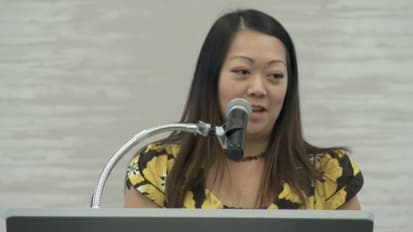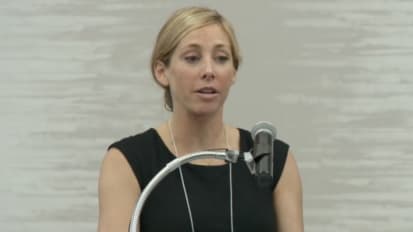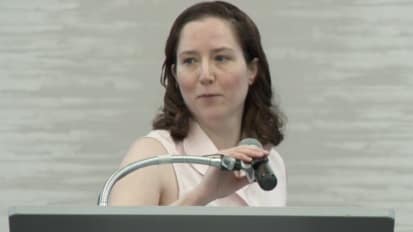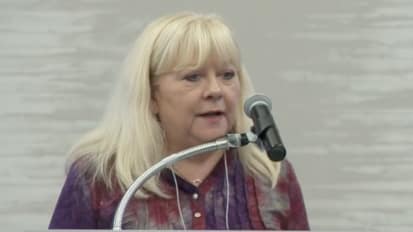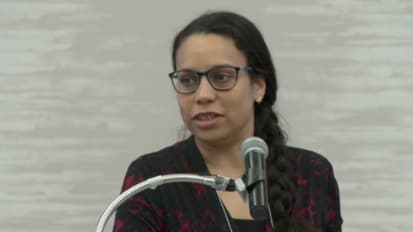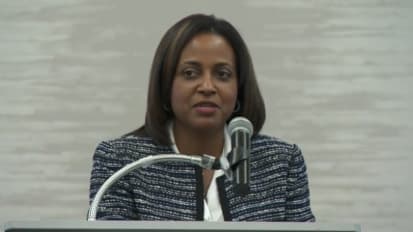Chapters
Transcript
JULIE LANDFORD: This is my topic-- Evidence-based Nutrition Guidelines for Breast Cancer Survivors Now, how many of you in the room knew that there are actually evidence-based nutrition guidelines? OK, good. A few. Oh, yes, yes, good. People have been listening in past years. OK. Because I find a lot of practitioners maybe aren't aware that there are good places that you can go to get this information when your clients come in with the latest crazy question.
I had an e-mail yesterday from someone who was doing a fundraiser for breast cancer selling cookies. And someone e-mailed them and said, um, shouldn't you not be selling cookies, because sugar causes cancer? And so why are you doing this? So then they're like, oh, I don't know what to say. So they e-mail me.
So anyway, there's just lots of it seems like myths, and misinformation, and oftentimes causes more anxiety than is necessary. So it's good to remind people there are strong evidence-based guidelines. And we want to focus on those first. OK? So then if people can get those down, then we can start layering maybe some of the other stuff on top of it.
All right, so, these are our three updates in 30 minutes. I have a clock. It hasn't started yet Woo, I got an extra few minutes. So we're going to cover nutrition and breast cancer. I put prevention in quotes. We're going to cover nutrition and breast cancer survivor facts and then key messages for patients, because I think what's most important is when you leave here today you have something that you can tell your patients in regards to nutrition that will help give them something that they can utilize to lower that anxiety, but also give them the information they need to eat healthy.
So here's my disclaimers, all right, conflicts of interest. I really wish I had some, but I don't have any. Off label use, I won't discuss any off-label use of fruits and vegetables, because-- and so I always start my talks off with this. There's no guarantees when it comes to cancer. Just like we're talking about fear of recurrence, there's not a guarantee, right? We can tell them to don't smoke, and exercise, and eat healthy, and it's still not a guarantee. We know all kinds of survivors who did everything right, and they still get cancer. And we know those people who did everything wrong. But they don't get cancer.
And I say, as we say in the South, bless their hearts. They did everything wrong. And so that is the truth. So when people come to me, I often have to remind them, you know, we want you to do these evidence-based strategies, but I'm not telling you that it's going to guarantee anything. And the other thing I point out to people is that the purpose of us talking about eating healthy and living a healthy lifestyle is definitely for improving your quality of life. So no matter what happens going forward, it's going to help you feel better during treatment, after treatment, 10 years after treatment, whatever, the purpose of us talking about this isn't to look backwards.
A lot of people, they want to find out well, why? Why do I have cancer? We obviously don't know the answer, but they oftentimes, oh, well, it's because I eat sugar, right? Or it's because I didn't eat enough fruits and vegetables.
And I always tell my patients please don't use this information to look backwards, because that's just not helpful. We're using this information to move forwards and feel as well as possible every day, whether that's someone who's going to be on treatment for the rest of their lives or somebody who is finishing up treatment and looking at trying to go back to normal life. Take care when using the term cancer prevention.
So as we talk about these evidence-based guidelines for breast cancer survivors, we have to point them towards the "prevention" guidelines, because that's what the evidence shows is that we want survivors to follow the guidelines for prevention. But then I have this problem, because when I tell a breast cancer survivor that these are the guidelines for prevention, they're like well I did those, and I still have cancer.
So I try as much as possible to not use the word prevention. Us as health care providers, we get it. We understand prevention means risk reduction, because we're looking at large populations of people and all of this. But the typical survivor, they don't know the difference. So I really say risk reduction as much as possible. If something is printed that says prevention, I point it out and say, you know, we're talking about risk reduction and give the disclaimer.
So saying that, here we go with nutrition and prevention. So the American Institute for Cancer Research-- how many of you are familiar with the American Institute for Cancer Research? A couple? OK, well you want to bookmark it, aicr.org. They estimate 33% of all breast cancer cases in the US could be prevented with simple everyday changes to what we eat and how we move. So in the US alone, 81,400 women every year could be spared having to face breast cancer.
So it's a significant number. We can't pinpoint who those people are, right? And I guess you could be pessimistic and say, well, that's only 33%, but it's significant. And so I think it's important that we know. They have put out evidence-based nutrition guidelines. So the World Cancer Research Fund works with the AICR. And they do continuous update projects, which you definitely want to visit their website pretty regularly and see when it's updated and which type of cancer they're updating.
So this is the website for their updates. And then I say they are the best research for the latest evidence-based information on nutrition and cancer, because that's their sole focus. I can't remember if I put-- so they have a second expert report, which was actually printed. So I just pulled it off my shelf to bring here, you know, like really thick. Anybody want to read it? I can loan it to you, because I probably haven't read it or pulled it off my shelf in years.
But hey, you know what? There's good news. Look at this one. The summary is like four pages, super-great, and it's also on their website so you don't have to order it. But they have great patient education materials. So they have information that you need to have that evidence information. But they have patient-oriented pamphlets and things like that as well.
And so what we're going to highlight first is just what are the pieces of evidence when they've gotten all these smart people together and done their expert report, what is it that they have found has evidence for decreasing or increasing risk for breast cancer? So clearly, food nutrition, weight, and physical activity interact in the cancer process in lots of different ways. And so I always remind people of that, because it's not like there's one little thing, right? It's not like blueberries have the magic phytochemical that's going to reduce cancer. It's a combination.
So even as we talk about diet, there is no one food, right? It's a combination of foods, and they work in lots of different ways. That's how our bodies work. They're complex, which is why you can't just take a pill and expect that's going to make up for all the different nutrients that we need to function. So they did a continuous update project in 2010. And breast cancer survivor, because they are the largest groups of survivors that are researched, especially when it comes to nutrition, because they're motivated.
So nutrition researchers really like breast cancer survivors, because they're going to participate in the studies, and they might probably actually do what you ask them to do, which is the problem with nutrition research, right? You try to do a study, and nobody ever does what you ask, and they mess up your research.
So they found that the evidence as of 2010 was consistent with the second expert report. So they didn't have any changes, which I think is helpful to know that, OK, what we've known is still what we know. And evidence is saying that. And so we haven't missed anything, which always makes me feel good. But these are the points that you would find in their summary specifically to breast cancer and diet.
So convincing evidence is their strongest, like their highest-ranking evidence. So there's convincing evidence this is for premenopausal breast cancer. So we'll do other ones for post. Convincing evidence that alcoholic drinks increase risk-- I always find this funny, because people will e-mail me on whatever, and they'll say, well, dairy causes cancer, so I shouldn't eat dairy, right?
Or whatever the latest thing is, and I always like to ask back, oh, yeah, so do you drink wine? Because somehow people can figure out that although alcohol is a known carcinogen, they figured out how to expose themselves to it in moderation and feel OK with that risk. But then somehow they find these other dietary factors that don't have any strong link, and they go for it.
So I do think it's important that we remember this. OK? So it does help people put things into context. So if you're working with somebody who seems to be off the charts on something crazy, you can remind them, well, this is a link for sure. So we want to make sure that we're looking at those things.
Convincing evidence that they decrease risk, breastfeeding, I mean, honestly, I don't ever talk about this, because by the time I'm working with somebody, it's unlikely that they're going to need to make this choice. So probable evidence is like the next lower level ranking evidence, but still pretty good. So increased risk for premenopausal breast cancer with adult-attained height-- can't do much about that.
I mean, we want our kids to be well-nourished and grow to their potential height, but OK. Greater birth weight-- and then probable evidence that the following dietary factors decrease risk is body fatness, which I think is interesting. And sometimes there's points where I just don't want to put them on here, because they get confusing. But since we're reviewing the evidence, I can't just pick and choose the ones I like.
So the point on this one that they say is current evidence does suggest that carrying excess body fat may offer some protection for premenopausal, but you'll see in the next slide, we know that it increases risk for postmenopausal. So this one is kind of another one of those like, uh, OK, what am I supposed to do with that?
So postmenopausal breast cancer-- "convincing evidence," again, this is the strongest evidence that body fatness, alcoholic drinks, and adult-attained height increased risk and then convincing evidence that breastfeeding decreases risk. "Probable evidence," this is postmenopausal again, adult weight gain, abdominal fatness-- that's an increased risk for postmenopausal breast cancer and then decreased risk for postmenopausal breast cancer as physical activity. OK, good, things we already know, but good information.
So those are essentially when it comes to the risk reduction side of things, those are the key points, which I think is interesting, because they're not usually the ones that make headlines. And the ones that make headlines is what people always email or show up in your office like, well, I read this on CNN or whatever it is, because they're not new, right?
And when I tell people is what usually hits the news is the one latest study. We can't tell anything from one study. We want multiple studies showing the same results. And a lot of times, the study that they're reporting was done in mice, right? And so I remind people too that that's interesting. The point in these mice studies or rodent models is for scientists to, oh, that's interesting. I should keep studying this. And what survives don't understand is that just because they found something, a result in mice, doesn't mean that we apply that to our daily lives.
So the study that came out-- I think it was maybe a year ago about sugar and breast cancer-- I don't know if guys got hit with that one. But it was not human model. So usually with these studies if they're reported in the news, it's very difficult to dig down and even find out where is the actual study that they were talking about. And the news will hype it up, because they want viewers and clicks, because that gets them money, right? So they're really using nutrition to confuse people and make money so helping people understand that the latest news headline doesn't necessarily mean you have to do that.
So these are our goals during treatment, which I think is really important to help people understand that you may have a different goal during treatment that you will after treatment so depending on where people are. But maybe if they're in treatment, they're doing well enough that we can go ahead and get them with health behaviors during treatment, and it depends on how are they doing, right?
So our primary goals are to meet calorie, protein, and nutrient needs, because we want to preserve their muscle mass, because that's going to help their body composition in the long run. So when we find these breast cancer survivors who are struggling, they said, well, I gained all this weight during treatment, we want them to maintain their muscle mass as much as possible.
And what they sometimes don't realize is how much their life has changed. And so if you're not using your muscle, it's going to go away. So we want them to preserve muscle. If they don't eat enough calories and protein, they're not going to be able to come keep muscle around either. So that's really important.
We want them to stick to their treatment protocol. I know doctors, radiation therapists, nobody likes people to miss treatment. So I always remind people we want you to stay as healthy as possible so you can get all the treatments that your doctor wants you to get, and prove their quality of life, and then improve their outcome, which is that long-term thing that they're always thinking about.
But really, for a lot of breast cancer patients, they probably don't have any nutrition-related side effects. They don't have too many things that are preventing them from eating a normal diet. And so we want them to follow the recommendations for after treatment. Guess what? There is a recommendation for breast cancer survivors after treatment.
OK, informational slide-- three million breast cancer survivors in the US. OK? Most studied area and survivor research and the American Institute of for Cancer Research released a systematic review of the evidence on lifestyle and breast cancer survivorships. It's the only survivor group they actually have data on. And here it is. And you want to remember this, because I think my questions come from this right here. We all want you to get good grades on that.
So "limited to suggestive evidence"-- and I'll tell you that this is not as strong as probable evidence and not as strong as convincing evidence, OK? So basically, these are like, oh, OK, we're watching this. But we're not sure that this is for sure. But what we have limited suggestive evidence on is that foods containing fiber, and foods containing soy, and being physically active decreases risk of all-cause mortality. Great, that'll fit along nicely with all our practical points when I get to the end.
Physical activity decreases risk of breast cancer mortality. Body fatness, total fat, and total saturated fat intake increases risk for all-cause mortality. Remember this, OK, we're calling this a dietary eating pattern in the questions-- I just reviewed the questions, OK. Total fat and total saturated fat intake increases risk for all-cause mortality. And then body fatness increases risk for breast cancer mortality and second primary breast cancer.
So for those of you who work with breast cancer survivors regularly, do you feel like they know this? Like do they know, OK, weight gain increases my risk? Yes? No? Anybody? Because the ones that I see, and we have some survivors in our office, they're being told this all the time. And I think it's kind of causing them anxiety.
So they do the little webinars from "Living Beyond Breast Cancer." Or they do educational things and they find out like, oh, my gosh, they have this evidence that the weight I gained during treatment is going to increase my mortality or whatever, and they have this anxiety, and they don't always feel like they know what to do with that.
So that's my experience, recognizing that I work with the people who are interested in nutrition or extra anxious about it. So the bottom line here is the expert panel concluded that available scientific evidence is still not strong enough to make more detailed recommendations specifically for breast cancer survivors. So you don't have to learn anything new, because we're telling you the same things still. Even though we've looked at the current evidence on breast cancer survivors, there's not consistent anything saying, yes, we absolutely need to be telling them anything different than we already are, or hopefully we already are.
So here's our recommendation for survivors after treatment. They should follow the recommendations for cancer prevention. So it's like just this big circle, right? It comes back around that, oh, my gosh, now we have to talk to them about the same things that we're talking to the general public when it comes to reducing risk for cancer. It actually makes my life pretty easy, because when I'm out educating, I educate all kinds of people at the same time, and we're really telling them generally the same things.
And those things are first off, be as lean as possible without becoming underweight. Second, be physically active for at least 30 minutes every day. Third, avoid sugary drinks and limit consumption of energy-dense foods. So I think this is the common response to somebody who says, well, someone told me sugar feeds cancer, and I should never eat sugar.
OK, well, we don't get to pick and choose which nutrients go to what cells in our body. That's what I always tell people. But let's use all common sense. We don't want them to be over-consuming sugar. So this is a good guideline. And then number four is just my favorite place to live all the time, because it's not fun to tell people what not to eat. Does anyone here like to keep the lists of things I'm not allowed to eat? That's not fun at all.
We want people to focus on what are the things that they need to include in their diet to improve or, I say, optimize their nutrition. People like that. So I focus on, OK, what do you actually need to be putting in? And guess what, when you focus on the things that you need to be putting in, some of the other things fall away, but you don't notice it so much. If you focus on the things you're not allowed to have, you get depressed. And you give up.
So eat more of a variety of vegetables, fruits, whole grains, and legumes. If you do that, you get all that fiber that we kind of talked about. Limit consumption of red meats and avoid processed meats. OK, we've known this for a long time. I know last year the whole bacon causes cancer thing came out. But we knew that. I was like, what's the big deal? We already knew all this.
So again, it's a dose response. So avoiding processed meats that have preservatives in them like nitrates is a recommendation. Red meats, it's 18 ounces a week or less. And pork counts as red meat, even though the Pork Council wants you to think it's the other white meat. It's not. It's the other red meat. If consumed at all, so here's our alcohol. Yes, alcohol is a carcinogen, but in moderation, it is fine.
I tell people if you don't drink, you don't need to start. But you know, if you're going to drink, limit alcoholic drinks to two drinks a day for men, one drink a day for women. I do have a little equality issue with this recommendation, but OK. Limit consumption of salty foods and foods processed with salt. This is mainly risk for stomach cancer where it's seen. But number eight is my second favorite. So number four where you have to eat more fruits, vegetables, whole grains, and beans is my first favorite. This is my second favorite, because people are nuts about this.
Do not use supplements to protect against cancer. OK? Actual evidence-based recommendation that you do not need to take supplements. All right, the exceptions are their lab levels low, like say you check a vitamin D, and their vitamin D is low. Yes, they should take a vitamin D supplement. Right?
If their iron is low, they're not going to get it back up with food. They need to take a supplement, but they're not going to just take it forever. You're going to check it again in three months and see if it's back. They don't need to be taking multivitamins if there's not a good reason. They don't need to be taking the Juice Plus, or the Nature's Pearl, or whatever is busting their budget.
They need to be spending their money on actual fruits and vegetables. So I like to remind people we have studies on people who take multivitamins, and their health outcomes are not better. And in some studies, they are actually worse. So let's just actually get them to eat the food.
So the most important thing about fruits and vegetables is that it gets on the fork, and in their mouth, and chewed up, and swallowed, because there's no other way you can get those. So these are just the key recommendations you'll notice that there's no recommendation saying you must eat organic food. Or there's no recommendation saying GMO foods are bad for you.
So when people come into me with those types of issues, I usually tell them that that's a choose your own adventure. That's a personal choice. That's not what's most important. And I tell them the things that are absolutely most important. If they want to eat organic, that's fine. If they want to pay for it, or they can afford it, or whatever. But it's not necessary for good health. Fruits and vegetables are necessary for good health. And we have lots and lots of data on that. Eating organic is not necessary for good health.
So when it comes to the weight discussion, I host a mindful eating program for survivors at Cancer Services, and we're here in Winston-Salem. So it's going on right now. We had week 2 last night. If you're interested in knowing more about what we talked about in those, I've been putting recaps up on my blog with like home assignments so people can participate virtually. So it's just cancerdietitian.com, and you can see recap for week 1 and recap for week 2.
But essentially, I think behavioral changes are the first place to start. We don't need to talk to them about their weight, because there's so many things that are going into that. They can be overcome with guilt. They can have issues from their past. What we want are people to change their behaviors. When they work on positive health behaviors, their weight will get where it needs to be. If they are being physically active, eating plenty of fruits and vegetables, they are going to be good.
So for all breast cancer survivors, achieving a healthy body weight should be a long-term wellness goal. And what we're wanting them to do is, hey, can we get you to eat plenty of fruits and vegetables? How do we know if they're eating plenty of fruits and vegetables? They might actually write it down. So maybe they need to keep a food record to see how they're doing.
So the WHEL study found support that even if a woman doesn't lose weight, simply eating more plant foods and engaging in 30 minutes a day of exercise can provide survival benefit. I think that's way more positive to come at it with let's get you to eat the nutrients that you need for your body to function. Let's move your body in a way where you're going to increase or maintain your muscle mass. It's going to give you more energy. Everybody wants more energy. OK? So you just tell them it's going to give you more energy. It's going to help you sleep better, and everybody likes it.
All right, so your body prefers nutrients in food, not pills. There's a good talking point that basically says you don't need to take nutrients in pill form, because it's not necessarily helping you unless you're deficient. The AICR has a list of what they call foods that fight cancer. And I don't think there's anything magical about this list. I'll tell you as soon as the some other council like Almond Council gets enough money to fund enough research, then they'll be on the list.
If it's a plant food, it's good for you. But what I point out about this list is flaxseed and soy are on it, which a lot of breast cancer survivors are very confused about. And so there's good evidence that shows that if you eat foods in normal forms, they're perfectly good for you. What we don't want when it comes to soy is we don't want them taking pills, powders, supplements, things like that.
But I also tell them, you know what? If it makes you uncomfortable to eat soy, if it makes you anxious, you don't have to eat it. There's lots of other foods that you can eat that can give you a lot of plant nutrients. So if you don't want to eat it, that's OK. All right, so no single food or food substance can protect you against cancer. evidence is mounting that minerals vitamins and phytochemicals, this is plant chemicals, interact to provide extra cancer protection.
And so essentially what we're suggesting is a plant-based diet. And what I find is people have no idea what that means. So we kind of need to give them a guide. And I brought a few handouts with me today that I'll just leave in the back. I didn't bring enough for everybody. But essentially what I tell people is it can be as simple as looking at how your plate is organized. And I actually had a very proud moment when I had two patients come in in one day who were sold every myth in the book.
I was telling him la, la, la, and then they said, well, my doctor gave me some information. And I was like, OK, what was that? Oh, my doctor told me to cover half my plate in fruits and vegetables, and a quarter of my plate in some kind of starchy, and whole grain, and a quarter of my plate in protein. And I about jumped out of my seat and did a little dance, because I was like, oh, hurray! That's something that they're getting this information-- and it was a radiation doctor.
I was just excited, because this is what the typical American does. And so sometimes it's not even necessarily the foods that are on their plate that's a problem. Granted, for a lot of people it is. But it might be just the proportion of foods that they need to change, because most people eat more meat than they need. They eat meat like they're bodybuilders or marathon runners. And we know they're not, right?
And so what do you do with extra protein? It's just sored as fat. So we want them to change that. We want them to get enough protein, but not too much. So this is kind of my bottom line, which is do your squats, eat your vegetables, wear red lipstick. We want them to go about and enjoy their lives, right?
So sometimes I'll tell you that what might be coming out when somebody comes in with a bazillion nutrition questions is sure, they need to see somebody who can help them figure out what's true. But they probably need to go see the therapist, because they're having anxiety, and this is where they're exercising their control.
And we need to help them figure out, well, the point of eating is to have good quality of life. And if they can't quite have that because they're so anxious, then the food might not be the actual issue. So I'll tell you that I do write cancerdietitian.com. It's part of our programs at Cancer Services, so we're not selling anything, just good health. We're a non-profit.
And I've done like webinars for patients, basically. And so I've done a plant-based diet for a cancer survivor's webinar that's on there where I cover multiple different eating patterns that are plant based that are good for survivors. So if there is somebody who's interested, they can go. There's no charge for any of that.
So this is how you can connect with me online on all the social media channels where people can find us, and I do classes and seminars here in Winston-Salem, so the Mindful Eating Program and other areas. And then, of course, both the hospital systems in Winston-Salem are really great partners and help us to get this information out as well. So I'm happy to take referrals. I don't charge for clients, but they're welcome to give me a call, or e-mail me, or come to our programs, or have a session. I think that's all I have. Resources.
Julie Lanford, MD, presents her topic 'Evidence Based Nutrition Guidelines for Breast Cancer Survivors'.
Related Videos
